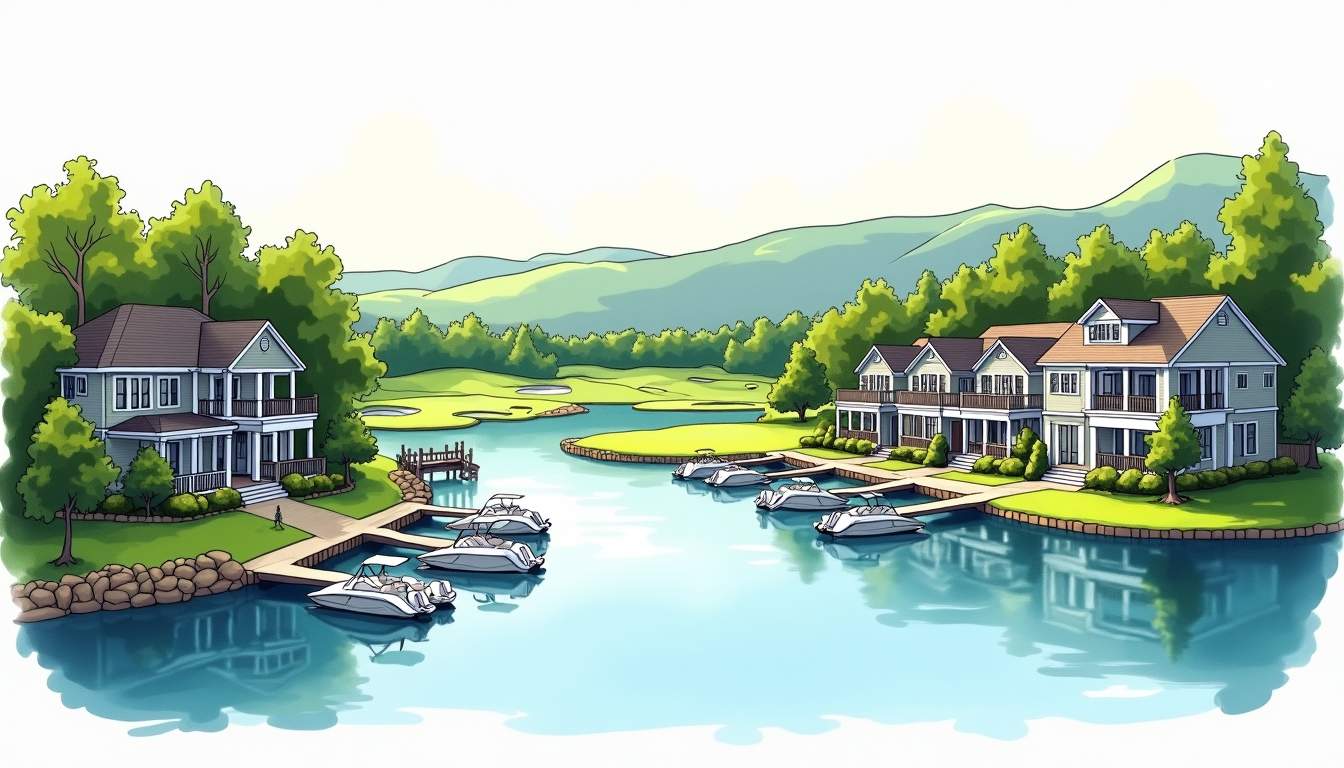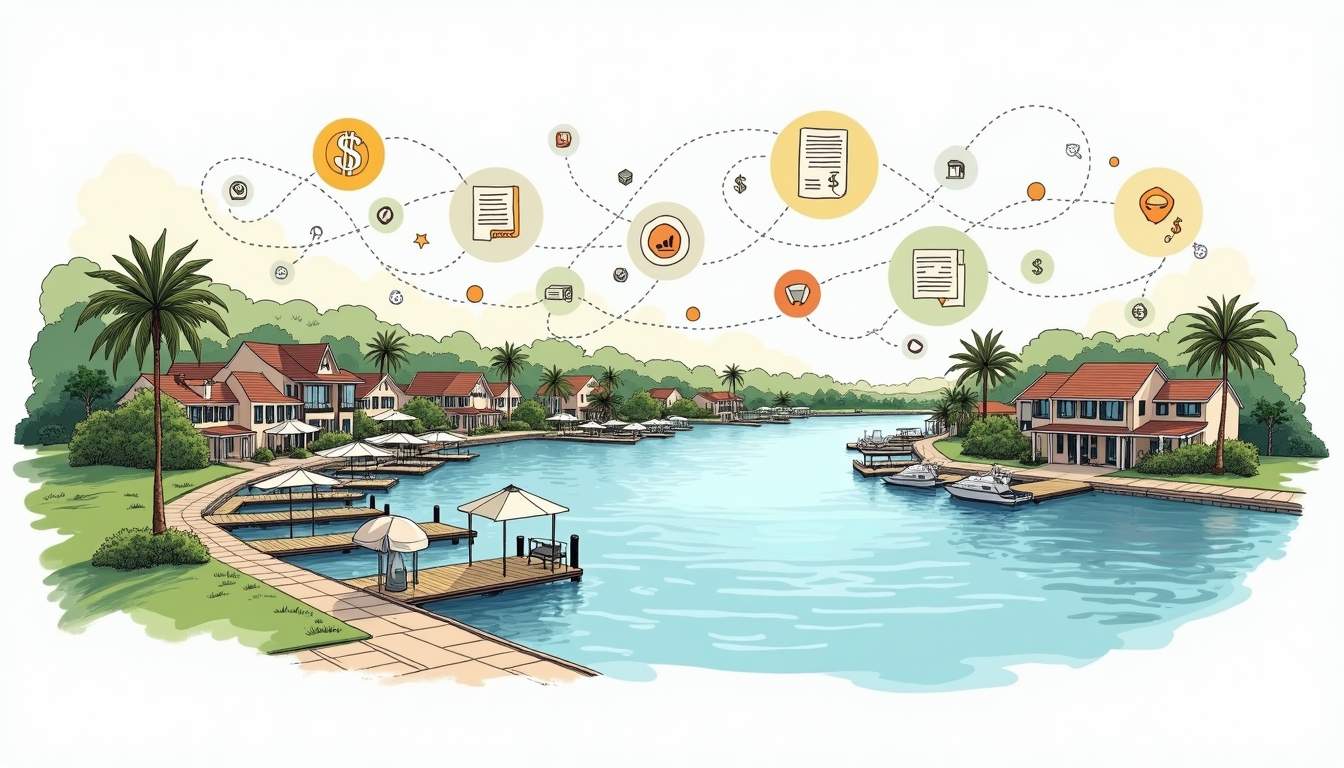
Owning a resort home that offers both boating and golf access combines two of the most appealing leisure pursuits into a single lifestyle investment. This guide walks through the important considerations—location, community rules, maintenance, resale value, and financing—to help prospective buyers weigh the trade-offs and make informed choices.
Resort properties that provide access to water and golf amenities create a versatile living experience. They attract a wide range of buyers: weekend escape seekers, retirees looking for active social scenes, and investors targeting vacation rental markets. The combination of boating and golf often means curated landscapes, professionally managed facilities, and a steady calendar of social activities.

Another advantage is lifestyle flexibility. On a single long weekend, it’s possible to spend the morning on the water and the afternoon on the course, then relax at clubhouse dining in the evening. This variety appeals to families and groups with diverse interests and can make the property easier to use year-round compared to single-amenity options.
Additionally, properties with both boating and golf amenities tend to appreciate well in value due to their broad appeal. The demand for homes that offer multiple recreational outlets is strong, particularly in regions where outdoor activities play a central role in the community culture. Owners benefit not only from their enjoyment of the facilities but also from enhanced resale potential and stronger rental income prospects.
Community engagement is another notable benefit. These resorts often foster tight-knit neighborhoods through organized tournaments, boating events, and special club gatherings. This social dimension adds a welcoming atmosphere that helps residents forge lasting friendships and enjoy a vibrant, active lifestyle beyond just the amenities themselves.
Choosing between coastal marinas and inland lake developments is a fundamental decision. Coastal properties typically offer access to larger waterways and ocean amenities such as saltwater fishing, island hopping, and deeper channels for larger boats. Inland lake communities often provide calmer waters, easier trailering access, and lower exposure to severe weather and salt corrosion.

Consider the climate and seasonality of the area. Northern locations may have limited boating seasons but vibrant summer communities, while milder climates can sustain year-round outdoor living. Proximity to airports, medical facilities, and major highways also affects convenience and rental potential, so weigh these practical factors alongside scenic appeal.
Waterfront properties are often subject to environmental regulations and permitting requirements. Coastal properties may face stricter building codes, setback rules, and hurricane mitigation standards. Inland lakes might have rules about dock construction, wake zones, or invasive species control. Understanding these regulations early prevents surprises and can impact long-term enjoyment and maintenance costs.
Resort developments generally fall into a few broad categories: private clubs, gated communities, and open-access resort areas. Private clubs often require initiation fees and annual dues but provide higher levels of service, reserved tee times, and exclusive marina slips. Gated communities may bundle amenities into HOA fees and enforce standards that protect property values. Open-access resorts can be more flexible but may have more visitor traffic and less predictable maintenance.
Slip and tee time availability is a practical detail that directly affects usability. A community with an undersupplied marina or a highly competitive golf course can frustrate owners who expect spontaneous use. Look for transparent policies on slip assignment, guest privileges, and advance tee time booking. If rentals are part of the plan, check whether owner access is restricted during peak rental seasons.
Anticipate several recurring costs: HOA fees, club dues, marina slip fees, and course maintenance assessments. These can vary widely and change over time. Detailed budgets and reserve studies should be requested during the due diligence process to see how funds are allocated for future repairs, dock replacements, or clubhouse renovations.
Some resorts adopt special assessments for large infrastructure projects. Confirm the history of assessments in the community and review meeting minutes for upcoming projects. Predictable, well-managed fees tend to sustain property values, while unpredictable costs can be a warning sign of deferred maintenance.
Resort homes come in various layouts and proximity to amenities. Waterfront properties with private docks are premium offerings because of direct water access, but they carry the highest upfront and ongoing costs. Water-view homes often sit slightly inland and offer lower maintenance while still providing scenic value. Golf-front homes deliver immediate course access and views but may raise privacy or stray ball concerns.
Assess the trade-offs: a waterfront lot gives boat convenience and resale appeal but brings higher insurance and potential for erosion. Golf-front homes provide lifestyle immersion in the game and easy cart access but might be noisier during tournaments and expose landscaping to golf ball damage. Water-view homes can hit a sweet spot for cost-conscious buyers seeking scenic benefits without the obligations of a dock.
Docking arrangements range from private, deeded slips to community docks and dry-stack storage. Private docks add value and convenience but are expensive to maintain and insure. Community docks spread costs among owners and reduce the maintenance burden but can have waiting lists and restrictions. Dry-stack storage is popular where waterfront space is limited and provides protection from weather, though it requires transport to the water.
Owning near water or on a golf course introduces specific maintenance tasks and insurance needs. Saltwater environments accelerate metal and mechanical wear, while manicured landscapes can demand irrigation and pest control. Regular dock inspections, seawall upkeep, and erosion control measures can be significant line items in annual budgets.
Insurance considerations include flood coverage, windstorm policies, and higher liability limits for water-related activities. Coastal properties often require separate flood insurance and may face higher premiums after major storms. Golf-front properties might need additional liability coverage for stray-ball incidents. Work with an agent who understands resort risks to tailor a comprehensive plan.
Storm planning is essential. Coastal owners should have evacuation plans for boats—trailering, hauling to dry storage, or securing in hurricane-ready slips. Inland lake communities may have different protocols, such as moving boats to protected coves. Review community emergency plans and ask neighbors about historical storm impacts and recovery timelines.
Financing resort homes can be more complex than primary residences. Lenders scrutinize rental history, HOA health, and the percentage of rental units in the community. Some loan products limit financing of properties within associations where a high percentage of owners are non-occupant investors. Interest rates and down payment requirements may differ for second homes and investment properties.

Property taxes and local assessments vary by jurisdiction. Waterfront properties often carry premium assessments due to location and amenity values. Additionally, rental income may be subject to transient lodging taxes, and some communities enforce minimum rental periods or cap nightly rentals. Consult a tax professional to understand how ownership will affect federal, state, and local tax obligations.
Resale prospects depend on location, quality of facilities, and the broader housing market. Properties that combine boating and golf typically retain appeal across demographics, but competition from new developments can shift buyer preferences. Well-managed courses and marinas, strong community governance, and thoughtful landscaping all support steadier appreciation.
Seasonal demand creates windows of peak sales activity. In many resort markets, spring and summer bring the most buyers for boating and golf properties. Timing a sale to align with these periods and ensuring the property shows well for both amenities—clean dock, well-kept fairways views—can enhance value and shorten time on market.
Marketing should highlight the dual-amenity lifestyle. Professional photos of the dock at golden hour, shots from the fairway toward the home, and images of clubhouse dining and social events create a compelling narrative. Practical staging includes boat-friendly storage solutions and outdoor living arrangements that reflect the leisure-focused use buyers expect.
Many buyers view resort homes as hybrid investments—personal use combined with short-term rentals. Properties with boating and golf access often command higher nightly rates, particularly when located near major attractions or events. However, success depends on local regulations, HOA rules, and the ability to manage bookings, cleaning, and maintenance between guests.
Professional management can simplify operations but eats into revenue. A careful net operating income projection, including vacancy rates and management fees, will clarify whether the rental market supports the investment. Also, consider the tax benefits and record-keeping requirements associated with rental income and depreciation.
Before committing, gather documentation and ask pointed questions. Review HOA bylaws, reserve studies, marina agreements, and recent meeting minutes. Inspect the dock, seawalls, and any community-operated structures. Request a history of special assessments and capital projects. Verify slip assignment policies and understand guest privileges for both the golf club and marina.
Hire inspectors experienced with waterfront properties. Marine surveyors can assess dock integrity, while structural engineers should examine seawalls and foundation conditions. For golf-front homes, evaluate turf runoff and irrigation systems to understand future landscaping obligations. Finally, speak with neighbors about community culture, noise levels, and how the association handles conflicts.
Resort homes with boating and golf access offer a rich lifestyle and strong market appeal when the right balance of amenities, management, and location is present. Success hinges on matching personal priorities—privacy vs. social life, low-maintenance vs. direct water access—and accepting the financial responsibilities that accompany these premium settings.
Careful research, site visits at different times of day and season, and realistic budgeting for maintenance and insurance will make the decision clearer. With thoughtful planning, a dual-amenity resort home can deliver years of enjoyment and a resilient investment in leisure real estate.
Ready to embrace the perfect blend of boating and golf living? Tennessee National offers luxury resort-style homes set against stunning Tennessee landscapes, featuring a Greg Norman Signature Golf Course and a private marina. Whether you prefer a move-in ready residence or a custom build, our premier gated community provides unmatched amenities and an active social calendar designed for your lifestyle. Schedule a Private Tour today and start making lasting memories at Tennessee National.